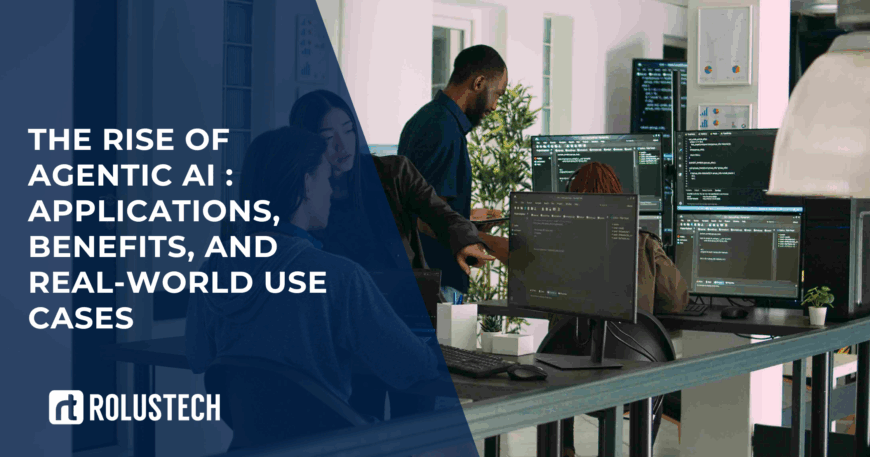The future of artificial intelligence is here, and it’s called agentic AI. Unlike traditional AI models that only process information, agentic AI systems can plan, act, and learn independently.
This new wave of intelligence is designed to operate with autonomy. Autonomous agentic AI is not just a tool, it’s a decision-maker. It handles tasks, adjusts strategies, and communicates with other systems in real-time.
Businesses worldwide are exploring agentic AI applications. From finance to healthcare, companies are discovering how this technology transforms operations. The future of agentic AI is filled with possibilities, and it’s reshaping how work gets done.
Why Agentic AI Matters for Businesses
Why is agentic AI gaining so much attention in 2025? The reason is simple impact.
Companies are moving beyond basic automation. Agentic AI systems bring autonomy, adaptability, and intelligence to workflows.
Efficiency is another factor. Autonomous agentic AI completes tasks faster and with fewer errors. It also scales easily, handling multiple processes at once.
The business case is clear: cost savings, increased productivity, and smarter decision-making. That’s why many executives view the agentic AI framework as essential, not optional.
For organizations wanting to stay competitive, adopting agentic AI applications is no longer a futuristic idea, it’s a necessity.

What Exactly Is Agentic AI?
At its core, agentic AI is a new model of intelligence designed to act independently.
Unlike traditional AI that relies on constant instructions, autonomous agentic AI sets goals, adapts to changes, and executes tasks without constant oversight.
It combines machine learning, natural language processing, and reasoning. This enables agentic AI systems to make decisions at scale.
Key agentic AI applications include:
- Customer service automation with adaptive responses
- Financial analysis and fraud detection
- Supply chain monitoring with predictive adjustments
- Personalized healthcare recommendations
The agentic AI framework ensures flexibility, scalability, and integration across industries. That’s why it’s becoming central to the future of agentic AI.
What’s New with Agentic AI in 2025
So, what’s different about agentic AI systems today compared to earlier AI?
First, autonomy has advanced. Autonomous agentic AI no longer waits for instructions, it identifies problems and solves them.
Second, integration is seamless. Modern agentic AI applications seamlessly connect to CRMs, ERPs, and cloud platforms.
Third, reasoning has improved. With the agentic AI framework, systems not only analyze but also explain their decisions.
Finally, collaboration is real. Agentic AI systems can communicate with each other, creating networks of autonomous decision-makers.
Together, these updates make the future of agentic AI more practical and business-ready than ever before.

Key User Interface Changes
Adoption depends on ease of use. That’s why the new agentic AI systems focus heavily on design. Dashboards are more visual and user-friendly. Businesses can monitor agentic AI applications through simple workflows.
Employees interact with autonomous agentic AI using natural language commands. No coding expertise is required. The agentic AI framework also introduces better reporting tools. Users can track decisions, performance, and ROI in real time.
Mobile-friendly platforms make it easy to manage agentic AI systems on the go. This accessibility is helping more organizations confidently embrace the future of agentic AI.
Steps to Plan and Execute Agentic AI Projects
Rolling out agentic AI requires careful planning and execution. Businesses should follow a step-by-step approach.
Step 1: Identify tasks. Choose repetitive, rule-based, or data-driven processes for automation.
Step 2: Select tools. Pick agentic AI systems with strong integration and compliance capabilities.
Step 3: Start small. Deploy autonomous agentic AI in one workflow first. Prove results before scaling.
Step 4: Measure success. Track efficiency, savings, and improvements from agentic AI applications.
Step 5: Train employees. Teams should understand how the agentic AI framework fits into their roles.
Step 6: Scale gradually. Expand to multiple areas after initial success.
Step 7: Keep evolving. Regularly update tools and strategies to match the future of agentic AI.
This approach ensures adoption without disrupting business continuity.

Performance Improvements from Agentic AI
The results of adopting agentic AI systems are already visible across industries. Customer support teams using autonomous agentic AI report faster resolutions and higher satisfaction.
Finance departments enhance accuracy in auditing and fraud detection by utilizing agentic AI applications. In healthcare, doctors rely on agentic AI systems for personalized treatment recommendations.
Supply chain managers use predictive analytics within the agentic AI framework to minimize delays.
Performance improvements include:
- Reduced operational costs
- Faster decision-making
- Higher productivity
- Better customer experiences
These measurable gains prove the future of agentic AI isn’t just hype, it’s delivering real business value.
Tips to Maximize the Value of Agentic AI
To achieve the best results from agentic AI systems, businesses should adhere to proven practices.
- Start with high-impact agentic AI applications that show clear ROI.
- Keep initial projects simple before moving into advanced workflows.
- Involve employees early to encourage collaboration with autonomous agentic AI.
- Monitor system performance through the agentic AI framework regularly.
- Explore new agentic AI applications as technology continues to evolve.
- Always prioritize security and compliance when selecting agentic AI systems.
By applying these tips, companies maximize efficiency while reducing risks.
Conclusion
The rise of agentic AI marks a turning point in technology and business. Companies that adopt agentic AI systems achieve better results, lower costs, and increased productivity.
With the expansion of agentic AI applications, industries ranging from healthcare to retail are undergoing rapid transformation.
Employees and autonomous agentic AI now work together, achieving efficiency and innovation. The future of agentic AI is not a distant vision, it’s happening now. Businesses embracing this shift will lead tomorrow’s market.
FAQs
What is agentic AI?
Agentic AI is an advanced AI system that plans, learns, and acts independently.
How is agentic AI different from traditional AI?
Traditional AI follows instructions. Autonomous, agentic AI sets its own goals and adapts independently.
What are common agentic AI applications?
Popular agentic AI applications include customer support, finance, healthcare, and supply chain automation.
Are agentic AI systems secure?
Yes. The agentic AI framework encompasses compliance, monitoring, and encryption to ensure safety.
Can small businesses affordably adopt agentic AI?
Absolutely. Many agentic AI systems are subscription-based, making them accessible to startups..




